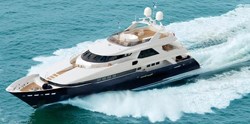Whither the marine market?
The marine market was hard hit by the recession, and it's coming back slowly, but is the market big enough to return it to its past glory?

No end market served by the composites industry has been harder hit than marine. Since the recession first started in 2007-2008, demand for boats of all types dropped dramatically. And, although the market is showing signs of life, it will be a while before it returns to the peaks seen in 2005-2006.
The U.S.-based website BoatingIndustry.com hosted a webinar recently that described the current state of marine market. There are signs of optimism:
- Boating participation is up 32 percent in the last five years
- 81 percent of boat owners have annual incomes of less than $100,000
- Powerboat sales were up 10 percent in units and 14 percent in dollars in 2012
- Sailboat sales were up 29 percent in 2012
- 95 percent of all boats are less than 26 ft long and thus are "trailerable"
- Total U.S. recreational marine craft sales were $35.6 billion in 2012, up from $32.4 billion in 2011, but still shy of the 2006 peak of $39.5 billion.
That said, there are troubling trends as well:
- Each year, the average age of boat owners increases 6 months
- Traditional powerboat sales are in general decline, with 157,000 units sold in 2012, compared to more than 500,000 units sold in 1988
- Average powerboat age today is 21 years, compared to 15 years in 1997
- 74 percent of all sailboats are more than 20 years old
- The total number of marine vessels registered in the U.S. has not changed in 15 years, despite a 25 percent increase in overall population
- Seven out of 10 first-time boat buyers sell their boat and leave the sport
- Baby Boomers, for a long time a major consumer of boats, is aging and thus less active in the sport
An aging fleet overall might signal that consumers are on the verge of upgrading to new boats and thus help propel the market into a high growth period. On the other hand, buying a used boat and retrofitting it with newer motors and equipment might be cheaper than buying a new boat altogether.
And certainly composites might be to blamed as well. The quality and durability of composite boat hulls has increased substantially the last 15 years. This extends the life of the craft and allows boat owners to retain and keep functional their older vessels.
The marine industry is the market into which composites have penetrated most thoroughly, thus its growth leads growth in composites. Clearly, the marine industry sees that it must attract new customers if it wants to return to the halcyon days of the past.
Visit BoatingIndustry.com/webinars if you want to view the entire webinar.
Related Content
-
Carbon fiber composite hydrofoils to enable “world’s fastest” electric ferry
The Candela P-12 Shuttle, set to launch in Stockholm, Sweden, in 2023, will incorporate lightweight composites and automated manufacturing to combine speed, passenger comfort and energy efficiency.
-
Plant tour: Avel Robotics, Lorient, France
From AFP hydrofoils to more efficient aircraft parts, Avel uses digital design, multiprocess production and a rule-breaking approach for complex 4D composites.
-
JEC World 2022, Part 1: Highlights in sustainable, digital, industrialized composites
JEC World 2022 offered numerous new developments in composites materials, processes and applications, according to CW senior editor, Ginger Gardiner, most targeting improved sustainability for wider applications.















